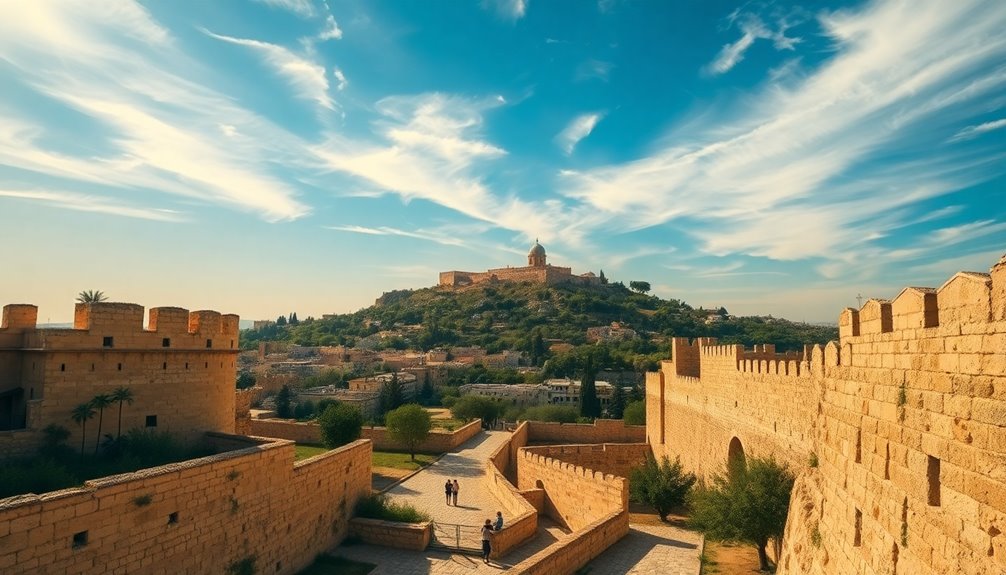Zion in the Bible isn't just a place; it embodies rich spiritual and cultural meanings. You'll first encounter it in 2 Samuel 5:7, when King David captured it, making Jerusalem the heart of Israel. Throughout the Old Testament, especially in Psalms and Isaiah, Zion represents God's presence and a promise of restoration. It symbolizes hope and reconciliation between God and His people. While often thought of as a specific location in Jerusalem, Zion has deeper theological significance that spans both the Old and New Testaments. Discovering its layers reveals even more about its role in biblical narratives.
Key Takeaways
- Zion is first mentioned in 2 Samuel 5:7 as a fortress captured by King David, establishing Jerusalem's significance in Israel's history.
- The term appears 152 times in the Old Testament, primarily symbolizing God's dwelling place among His people and their spiritual center.
- Zion represents themes of hope and restoration, with prophetic writings assuring its future glory and redemption, as seen in Isaiah and Jeremiah.
- In the New Testament, Zion evolves into a symbol of a spiritual kingdom, emphasizing its significance beyond a mere geographical location.
- Misinterpretation of Zion often reduces it to a physical site, neglecting its deeper theological implications as God's presence among His people.
Introduction

Zion holds a prominent place in the Bible, and its significance goes beyond just a geographical location. First mentioned in 2 Samuel 5:7, Zion was the fortress captured by King David, marking the establishment of Jerusalem as the political and spiritual center of Israel. Throughout the Old Testament, the term "Zion" appears 152 times, primarily in Psalms, Isaiah, and Jeremiah, underscoring its critical role in biblical narratives.
Zion symbolizes God's dwelling place among His people. In Psalm 132:13-14, it's described as God's chosen resting place, which highlights its divine importance. The concept of Zion transcends its physical boundaries, embodying spiritual ideals and eschatological visions that resonate with both hope and restoration.
Often personified as the "Daughter of Zion," it represents Jerusalem and its inhabitants, reflecting the emotional depth found in prophetic literature.
As you delve into the richness of Zion, you'll discover its layered meanings that encompass both a historical fortress and a powerful symbol of divine presence, community, and promise. Understanding Zion is crucial for grasping the broader themes of faith and identity in the biblical narrative.
Scriptural References to Zion

When you explore the scriptural references to Zion, you'll find its significance woven throughout the Bible.
From David's capture of the fortress in 2 Samuel to its symbolic representation in the Psalms and prophetic books, Zion holds a central place in both Israel's history and spiritual narrative.
In the New Testament, its reference even extends to the Christian faith, highlighting the continuity of its importance.
Primary Bible References
Throughout the Bible, the concept of Zion captures a profound spiritual and historical significance. First mentioned in 2 Samuel 5:7, Zion refers to a fortress captured by King David, establishing the city of Jerusalem as Israel's political and spiritual center. In the Old Testament, the term "Zion" appears 152 times, particularly in Psalms, Isaiah, and Jeremiah, portraying it as a symbol of God's presence and the Jewish homeland.
For instance, Psalms frequently depict Zion as a sacred place, emphasizing its importance in Psalm 2:6, where it's identified as the location of God's chosen king. Psalm 87:2 even calls it the "city of God." Isaiah 60:14 speaks of Zion's future glory, indicating that nations will honor it, while Jeremiah 3:14 reflects on it as a site of lament and hope for restoration.
In the New Testament, Zion's relevance continues in Hebrews 12:22, linking it to the heavenly Jerusalem and the spiritual kingdom that believers are called to. This enduring significance showcases Zion's vital role in both Jewish and Christian theology, marking it as a central theme throughout scripture.
Secondary Bible References
The concept of Zion resonates deeply in various biblical texts, serving as a powerful symbol of hope and divine promise. In the Old Testament, Zion is referenced 152 times, emphasizing its significance as the "city of God." For instance, Psalms often celebrate Zion as a sacred space for divine worship, highlighting its central role in Jerusalem (Psalm 87:3).
In the prophetic books like Isaiah and Jeremiah, Zion represents both the struggles faced by Israel and the promise of future restoration and redemption, as seen in Isaiah 52:1 and Jeremiah 3:14. Here, you find the dual nature of Zion—its acknowledgment of present hardship alongside the assurance of hope.
Transitioning to the New Testament, Zion shifts to a more spiritual context. It's depicted as the heavenly Jerusalem and the spiritual kingdom of God (Hebrews 12:22). This imagery extends Zion's significance, linking it to themes of salvation and the fulfillment of God's promises, as exemplified in Isaiah 60:14.
For believers, Zion embodies the ultimate hope for deliverance, reaffirming the enduring message of restoration throughout scripture.
Ancient Jerusalem's Significance

Capturing the ancient city of Jerusalem marked a turning point in Israel's history, transforming it into a powerful political and cultural hub. After King David seized the Jebusite fortress, this city became the royal capital, establishing its significance in Israel's national identity. The Temple Mount, located in Jerusalem and part of Mount Zion, was home to Solomon's Temple, which symbolized God's presence among His people.
The significance of Mount Zion extends far beyond its geography; it represents the spiritual heart of Israel, deeply intertwined with themes of destruction and restoration. Throughout biblical texts, Zion is frequently mentioned, embodying the hopes and dreams of its people. This holy city has become a focal point for religious Zionism, where believers see it as a vital element of their faith and heritage.
Through psalms and prophetic writings, the connection between ancient Jerusalem and its role in God's plan is unmistakable. As you explore this rich history, you'll understand the enduring importance of Zion, not just as a physical location, but as a symbol of divine promise and hope for the future.
Symbol of Divine Promise

Hope resonates deeply within the symbol of Zion, representing God's steadfast promise to His people. In the Old Testament, Zion is depicted as the chosen dwelling place of God's presence, as outlined in Psalm 132:13-14. Here, you see God's protection and His commitment to a covenant relationship with Israel, reinforcing His divine kingship (Psalm 99:2).
The prophetic writings of Isaiah and Jeremiah assure you that Zion will experience restoration and redemption, instilling hope for Israel's future (Isaiah 52:1; Jeremiah 3:14).
Transitioning into the New Testament, Zion evolves into a symbol of a spiritual kingdom. You're invited to partake in the heavenly assembly associated with it, as noted in Hebrews 12:22. This concept of Zion embodies God's unwavering promise, showcasing themes of hope, reconciliation, and the ultimate fulfillment of His covenant with humanity.
Whether in the context of ancient Jerusalem or as a spiritual kingdom, Zion remains a powerful reminder of God's presence and His divine promise, encouraging you to hold onto hope and trust in the restoration He offers.
Zion's Geographical Location Misconceptions

When you think of Zion, it's easy to get caught up in the confusion surrounding its exact location.
Many misunderstandings stem from historical interpretations and the evolving topography of Jerusalem.
Let's clear up these misconceptions and explore how they misinterpret Zion's true purpose.
Debunk Common Misunderstandings
Addressing common misconceptions about Zion's geographical location is essential for understanding its biblical significance. Many people mistakenly believe that Zion solely refers to the western hill of Jerusalem, but it originally identifies a Jebusite fortress that King David captured, establishing its link to the city (2 Samuel 5:7).
In reality, Zion primarily refers to the eastern hill, known today as Ophel.
Throughout the Old Testament, Zion is mentioned 152 times, particularly in the Psalms and Isaiah, highlighting its importance as both a spiritual and physical site. It symbolizes not just a hill, but the whole of Jerusalem and the Jewish nation, encompassing spiritual and political dimensions.
Moreover, modern scholarship reveals that the identification of Mount Zion has evolved over time. Contrary to earlier misconceptions, its location is confirmed as part of Jerusalem's ancient landscape.
Recognizing these facts helps clarify Zion's role in the Bible. By understanding its true geographical location, you gain deeper insights into its significance in the Jewish faith and its representation in biblical texts.
Misinterpretation of Zion's Purpose
Although many people see Zion simply as a physical location in Jerusalem, it actually embodies a much richer purpose within the biblical narrative. The common misinterpretation of Zion focuses on its geographical identity, often identifying it solely with the western hill of Jerusalem. However, modern scholarship points to the eastern hill, historically known as the Ophel, where significant biblical events unfolded.
Originally, Zion referred to a Jebusite fortress captured by King David, but its meaning has expanded to encompass the entire city of Jerusalem and its spiritual significance. This confusion can obscure Zion's specific historical and religious context, reducing it to merely a place rather than understanding its rich theological meaning.
In contemporary religious discourse, the term "Mount Zion" is frequently used, yet it overlooks the dual significance of this location as both a physical space and a symbol of God's presence among His people.
Misunderstandings of Zion's purpose can lead to an oversimplified view that neglects its prophetic implications within the narrative of Israel's destiny. Recognizing Zion's true depth allows you to appreciate its vital role in the biblical texts and the overarching story of faith.
Community Engagement Initiatives

When you think about Zion, its relevance in daily life becomes clear through various community outreach programs.
These initiatives not only educate but also connect you with the rich history and spiritual significance of Zion.
Engaging in local events can foster a sense of belonging and deepen your understanding of this important cultural heritage.
Zion's Relevance in Daily Life
Zion serves as a powerful symbol in daily life, inspiring various community engagement initiatives that foster unity, hope, and restoration. Zion symbolizes a space of divine presence, encouraging you to participate in programs that promote social justice and support for marginalized groups.
Through these initiatives, you can actively engage in interfaith dialogues, which honor Zion's significance across different religious traditions and help build understanding among diverse communities.
Moreover, educational efforts often highlight the historical and spiritual narratives of Zion, allowing you to connect with your heritage while promoting cultural awareness. This connection not only enriches your perspective but also empowers you to share these stories within your community.
Volunteer efforts, like community clean-up days or assisting local charities, reflect the essence of Zion as a refuge and source of strength. By participating in these activities, you contribute to creating a positive environment that nurtures hope and restoration for all.
Ultimately, embracing Zion's relevance in your daily life encourages a commitment to fostering a supportive atmosphere, where everyone can thrive and feel protected.
Local Outreach Programs
Local outreach programs play a crucial role in building stronger communities by directly addressing the diverse needs of residents. In the city of Jerusalem, these initiatives foster community engagement through various activities, such as food drives, health screenings, and educational workshops.
By collaborating with local businesses and schools, outreach programs create volunteer opportunities that strengthen neighborhood ties and promote civic responsibility.
Mentorship programs are particularly impactful, supporting youth in their personal development and academic success. These initiatives not only empower the younger generation but also help connect vulnerable populations, such as the elderly, who may need companionship and assistance with daily tasks.
By ensuring that everyone feels included, outreach programs contribute to a greater sense of belonging among residents.
Moreover, effective outreach efforts can lead to improved mental health outcomes and enhanced community cohesion, reflecting God's presence in our lives. Additionally, incorporating programs similar to pet therapy initiatives can further enhance emotional well-being for community members facing challenges like dementia and Parkinson's disease.
In the context of the Jewish national identity, these programs serve to reinforce cultural ties and promote unity.
Ultimately, local outreach programs are essential for nurturing a supportive environment where everyone can thrive and feel valued.
Zion's Enduring Cultural Legacy

Drawing on a rich tapestry of religious and cultural significance, Zion's legacy continues to resonate across various traditions and movements. You might find that Zion symbolizes hope and refuge, inspiring numerous hymns and religious texts that highlight its divine presence.
In reggae music and Rastafarian beliefs, Zion represents a utopian ideal of unity and freedom, reflecting the deep cultural expressions rooted in these communities.
For those in the Latter Day Saint movement, Zion signifies a peaceful society where believers gather, showcasing its spiritual and cultural importance.
The concept of Zion has also played a crucial role in political movements, particularly Zionism, which emerged in the late 19th century to advocate for a Jewish homeland. This movement has profoundly impacted Israeli national identity and continues to influence discussions around cultural identity today.
Moreover, Zion serves as a focal point in contemporary interfaith dialogues, representing shared spiritual heritage and aspirations among diverse religious communities.
Additional Resources

Understanding the multifaceted significance of Zion can be enhanced through various resources that explore its biblical, historical, and cultural dimensions.
For a deeper dive into Zion's importance, you might start with the Old Testament, where it's mentioned 152 times, especially in Psalms, Isaiah, and Jeremiah. These texts illustrate Zion not just as Jerusalem but as a symbol of Israel's spiritual heritage.
You can also explore 2 Samuel 5:7, where Zion is identified as the fortress captured by King David, establishing Jerusalem as the center of political and spiritual life.
In the New Testament, passages like Hebrews 12:22 affirm Zion as God's dwelling place among His people.
To grasp Zion's prophetic significance, examine prophetic literature such as Isaiah 52:1 and Joel 2:32, which speak to its future restoration and role in God's kingdom.
Additionally, consider how the concept of Zion evolved during the Babylonian Exile, influencing modern Zionism as a movement for Jewish statehood.
Together, these resources will enrich your understanding of Zion's profound impact across time and its enduring relevance in discussions of faith, identity, and belonging.
Frequently Asked Questions
What Does Zion Signify in the Bible?
Zion signifies more than just a location; it represents hope, identity, and community.
When you think of Zion, you see a symbol of divine presence and the aspirations of a people united in faith.
It's where you find strength and a promise of restoration.
As you explore its significance, you'll discover how it embodies a spiritual kingdom, inviting you to connect with a deeper sense of purpose and belonging.
What Did Jesus Say About Zion?
When you explore what Jesus said about Zion, you find deep compassion and a call for redemption. He expressed a longing to gather its people, likening it to a hen gathering her chicks.
Jesus emphasized that true worship transcends physical locations, urging you to worship in spirit and truth. His references signify a new understanding of community, showing that Zion symbolizes a connection to God and the fulfillment of His promises for all believers.
What Happened at Zion in the Bible?
When you explore what happened at Zion, you uncover a rich history.
It was a significant site where King David captured it, establishing Jerusalem as Israel's capital. You'll find that Solomon later built the first Temple there, creating a central worship place.
Throughout history, Zion symbolizes refuge and hope for many, representing the Jewish nation's spiritual aspirations.
Prophetic visions further highlight its importance in future restoration and divine plans.
Where Is Zion in the Bible Today?
When you think about Zion today, consider it as both a physical and spiritual concept.
It's often associated with Jerusalem, but it also represents a deeper connection to faith and hope.
You'll find references to Zion in various texts, symbolizing God's presence and the future restoration of His people.
As you explore this idea, remember that Zion embodies the aspirations of many, bridging both history and spiritual significance in contemporary contexts.










